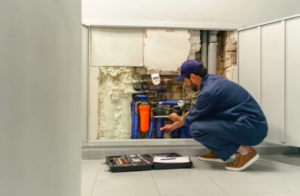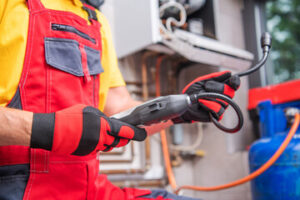Industrial plumbing involves the construction of pipe networks for the transport of fluids. These pipes must be able to withstand high pressure and specific temperatures.
Issues like a leaky sink or inefficient water heater can impact a commercial space. This is why prompt repairs are so crucial for these systems. Visit Website to learn more.

Industrial plumbing is a hugely important part of maintaining proper facilities in any commercial building. It’s a complex field that requires expert knowledge to properly design, install, and maintain. It’s also a field that is often misunderstood by the general public, and there are many people who don’t know what it involves or why it’s so important.
Unlike residential plumbing, which deals with only a few pipes and facilities, industrial plumbing is designed for large-scale water usage. These pipes are thicker, and they must be able to handle much higher levels of pressure and flow velocity. Additionally, these pipes must be able to transport more than just water, such as waste or chemicals. The plumbers who specialize in industrial work are familiar with all these issues and can create a system that is able to meet the needs of the facility without any problems.
The plumbing systems in commercial buildings also have to be more durable than those in homes. This is because they are often used much more frequently. For example, if a toilet is flushed hundreds of times a day in a school, it is going to start showing signs of wear and tear a lot faster than a toilet that is only used 50 times a day. This is why commercial plumbing systems are often designed with a higher grade of materials and more durable fixtures.
Another thing that is different about industrial plumbing is that it has to be well coordinated with other parts of the building. For example, if there are a number of sinks and toilets in a stadium that are being used during a big event, the plumbing must be designed so that these facilities are able to operate without disrupting the event.
There are many different aspects to this type of plumbing, and it’s one of the reasons why companies who offer industrial plumbing services have a lot more work on their hands than plumbers who only work with residential customers. This is because it takes a lot of planning and expertise to make sure that all the components of a plumbing system are working together to provide clean, safe, and reliable water for an entire building or facility.
When most people think of plumbers, they picture residential plumbers who take care of things like clogged drains and water leaks in homes. However, there’s a whole other segment of the plumbing industry that deals with industrial buildings, and this is where industrial plumbers come in.
The main task of industrial plumbers is to set up pipe networks that transport fluids. These fluids are usually intended for a specific purpose and need to be transported at certain pressure and temperatures. Therefore, the pipes used in an industrial plumbing system are typically thicker and more durable than those found in a home.
Another important aspect of industrial plumbing is to install and maintain the heating, cooling, and sprinkler systems of a building. These systems are necessary for keeping workers comfortable and productive, as well as for maintaining the safety of the building and its occupants. Industrial plumbers also have the skills and knowledge to develop detailed reports of an industrial building’s water usage and suggest ways to reduce it.
Besides water, industrial plumbing can also deal with other fluids such as gas and oil. In these cases, the plumber will have to consider their physical properties and how they might affect other materials that could be mixed with them. This is why it’s so important for a professional industrial plumber to know all of the laws and regulations governing their work.
Industrial plumbers are often called on to deal with emergencies in industrial facilities. For example, if a food factory suddenly loses its water supply or the drains become blocked, it’s the industrial plumber who will have to react quickly and efficiently. To handle such emergencies, they will usually need to have access to a vehicle with a trailer that can carry tools and equipment, as well as an experienced technician who can manage the situation until help arrives. This is especially important since many industrial facilities operate on tight schedules and cannot afford to shut down their production lines for long periods of time.
When most people think of plumbers, they imagine residential plumbers working on clogged drains and leaky toilets. In reality, though, there’s a whole other realm of plumbing that keeps businesses, hospitals, schools and factories running smoothly: industrial plumbing.
Unlike residential plumbing, which is mostly focused on household water usage, industrial plumbing is all about larger scale projects and equipment. It’s not uncommon for commercial properties, like office buildings and shopping malls, to have dozens of sinks, toilets and water fountains spread across multiple floors. In these cases, the piping systems can get extremely complex, making it more difficult for plumbers to troubleshoot issues when they arise.
This is where the training of an industrial plumber comes into play. Unlike residential plumbers, who can typically learn on the job or attend a vocational school to become certified, industrial plumbers must complete an apprenticeship of 4-5 years before they’re eligible to take the test to become licensed. The responsibilities of an industrial plumber include installing and maintaining pipes that transport water, waste, steam or gas within a facility. Often, these piping systems are hidden from view behind walls or drywall, so it’s important for plumbers to know how to navigate these spaces without damaging the building.
The first thing that happens when an industrial plumber gets called out to a job is an initial assessment. They’ll listen to the customer’s description of the problem and ask questions to gain a better understanding of the situation. From there, they’ll either repair the existing piping or install new lines. If they’re installing new lines, they’ll need to consider factors like pipe diameter, material type, piping length and whether or not the existing pipes are able to support the anticipated water usage.
The work of an industrial plumber can be dangerous, so it’s important for plumbers and their employers to follow proper safety protocol. This includes wearing personal protective equipment (PPE) when handling pipes and other materials, as well as following hazard communication and chemical safety policies.
There’s no denying that indoor plumbing has made life far more convenient than it would be without it. When issues like a dripping faucet or a broken water heater occur, homeowners turn to their local plumber for help. But what about businesses? What if they have a problem with their toilets or sinks, for example? Who do they call then? While residential plumbers take care of problems in homes, industrial plumbers serve a much bigger purpose.
In a business setting, the pipes and fixtures that industrial plumbers service are used on a much more frequent basis. This means they’re also more likely to break down. Issues such as leaky taps or inefficient water heaters are much more significant problems in an industrial setting than they are in a home because they could result in massive waste of resources and cost the business money.
Additionally, commercial buildings often contain a lot of equipment and machinery that can be very delicate or expensive to replace. Industrial plumbers are able to troubleshoot and repair these systems so that businesses can continue operating as normal.
The most common services that industrial plumbers offer are installing and repairing water pipes, gas lines, and vents. They can also use fittings to construct fixtures such as showers and sinks (although this doesn’t include toilets as they belong to a separate trade). Industrial plumbers are skilled at working with a variety of materials, including stainless steel, copper, cast iron, and PVC.
Leaks and other problems in industrial settings are a major concern because they can lead to costly resources being wasted and potentially even health violations. Industrial plumbers ensure that the plumbing systems in hospitals, schools, and factories are up to date with the latest specifications to prevent these types of issues.
Industrial plumbing is an essential part of our daily lives, and it’s important to have a reliable plumber on hand when issues arise. Whether it’s a clogged drain that stops up the entire system or an old, corroded sewer line, industrial plumbers can provide quick and efficient repairs so that businesses can continue operating smoothly.

